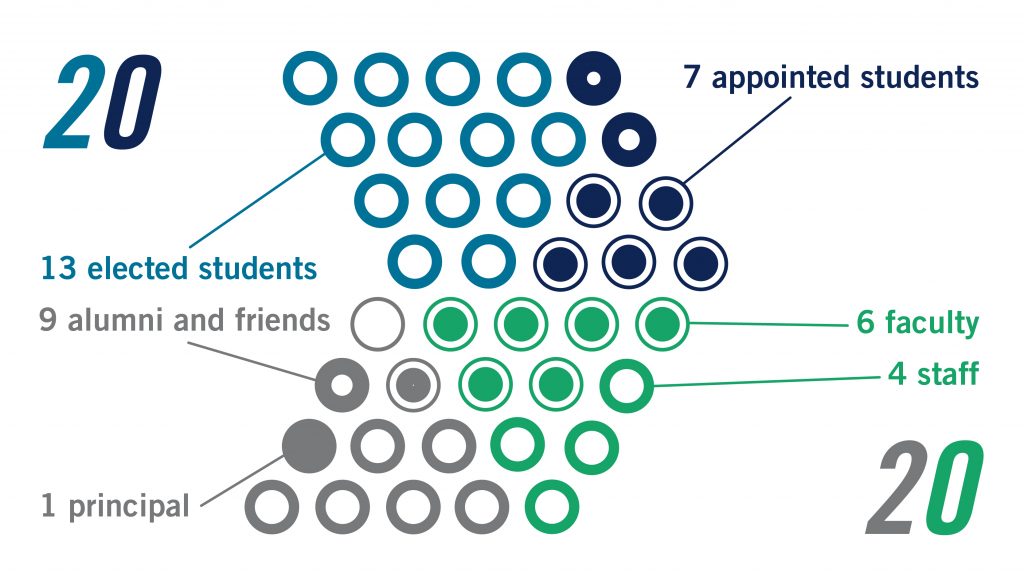Join the Innis College Council (ICC)
Innis College is the only Arts & Science college at U of T that has parity government. This means there is an equal number of students to faculty/staff positions in our governing body — what’s called the Innis College Council (ICC).
Why is this important for you to know? The 40 ICC members (20 students and 20 staff/faculty/alumni) oversee all college decision-making, ensuring that the decisions made reflect the values and needs of our diverse Innis community.
Since its founding, Innis has enjoyed a proud legacy of transparent and accountable governance, coupled with strong and active student voices. Learn how to get involved

How the ICC works – Boards and Committees
Four primary standing committees, known as boards, make up the ICC. These boards are the Academic Affairs Board, the College Affairs Board, the Community Affairs Board, and the Student Affairs Board. A fifth group reports directly to ICC, the newly established Equity, Diversity, Inclusion & Accessibility Committee.
The boards establish committees that address various governance issues. For example, there is a residence committee, admissions and awards committee, and several others that come under the auspices of these boards.

1. Academic Affairs Board
The Academic Affairs Board meets to discuss the operations and effectiveness of the entire Innis College academic programs (i.e., Cinema Studies Institute, Innis One Program, Urban Studies Program, Writing & Rhetoric Program).
2. College Affairs Board
The College Affairs Board monitors and evaluates policies and developments pertaining to the administration and use of all college facilities and services. It is also comprised of the Residence Committee, which specifically oversees Innis Residence.
3. Community Affairs Board
4. Student Affairs Board
The Student Affairs Board monitors and evaluates the operations of the College’s non-academic services, student life programs, and student society/council bodies (e.g., ICSS, IRC). This board includes two subsidiary, standing committees: Recruitment, Admissions, and Awards Committee, Student Services Committee, and Co-Curricular Record (CCR) Local Evaluation Committee. The latter reviews, evaluates, and approves College student activities and positions for the University’s Co-Curricular Record.
5. Equity, Diversity, Inclusion, and Accessibility Committee
How you can get involved
Every September all Innis College Council nominees are invited to submit a brief candidacy statement indicating how they will contribute to student/college governance. Then Innis students vote for their candidates of choice.
This is your opportunity to make a difference in student life at Innis, and enhance your leadership, decision-making, and teamwork skills. You can also enter this on your Co-Curricular record.
Want to attend an ICC meeting?
You are invited to attend ICC meetings, which happen four times a year, typically October, December, February, and April. Check back regularly for upcoming meetings, or visit the Happening@Innis page.
Questions? Want to get involved?
Are you interested in becoming a nominee for the fall ICC by-elections? Or do you have any questions about the ICC and how you can get involved? Contact council secretary, Ben Weststrate at ben.weststrate@utoronto.ca.
ICC Handbook
Learn more about the ICC, including the constitution and bylaws. Explore the various committees to see if there’s one that fits your interests.
ICC Meeting Minutes
Download past meeting minutes for the ICC.